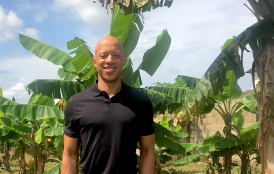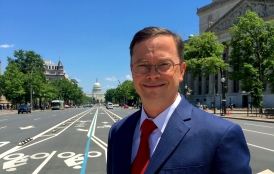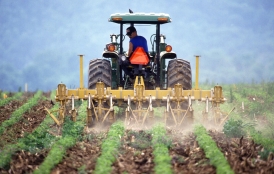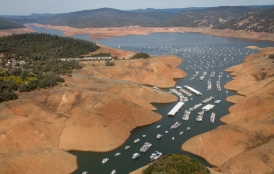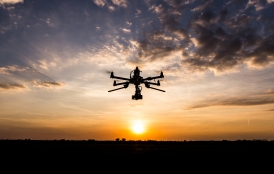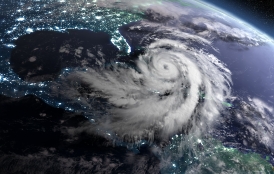The Stanford School of Earth, Energy & Environmental Sciences is now part of the Stanford Doerr School of Sustainability.
This page is currently being maintained for archival purposes only. For the latest information, please visit us here.
Human conflict heats up with global warming
A chance course at Stanford and a study-abroad trip to Nepal changed the trajectory of Marshall Burke’s career, leading him to a human-focused approach to studying climate change. His latest work deals with the link between rising temperatures and human violence.
By
Ker Than
Stanford School of Earth, Energy & Environmental Sciences
April 2, 2015
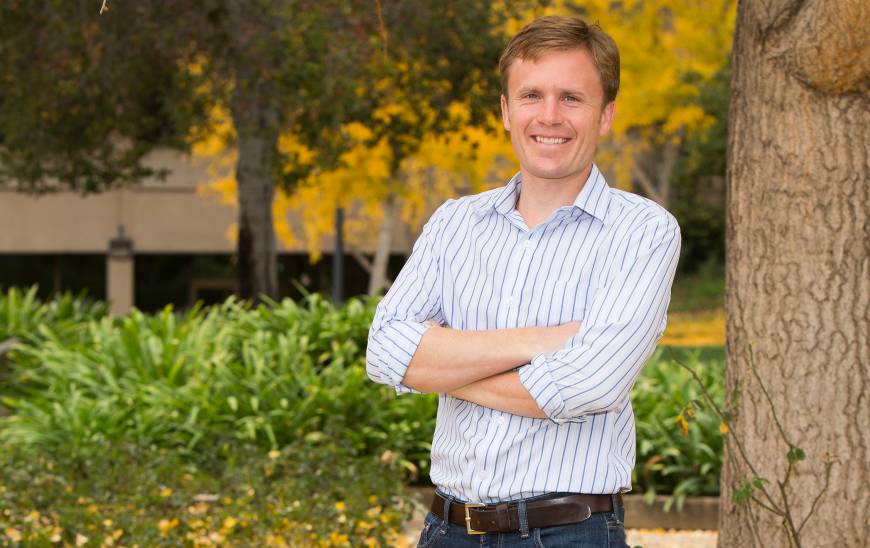
Credit: Stacey Geiken
I pray thee, good Mercutio, let's retire:
The day is hot, the Capulets abroad,
And, if we meet, we shall not scape a brawl;
For now, these hot days, is the mad blood stirring.
That a connection exists between hot temperatures and flaring tempers is an old observation. In William Shakespeare’s Romeo and Juliet, Benvolio begs his friend Mercutio to take shelter from the heat, lest it lead to a street fight with a member of the Capulet family.
“Even in Shakespeare’s time, it was recognized that people are more likely to lose their tempers when it’s hot outside,” said Marshall Burke, an assistant professor in the department of Environmental Earth System Science. Burke is also a center fellow at the Freeman Spogli Institute (FSI) for International Studies and the Center on Food Security and the Environment, a joint effort between FSI and the Stanford Woods Institute for the Environment.
The link between temperature and violence has come under increased scientific scrutiny in recent years because of climate change. In 2013, Burke made waves in scientific circles and in the popular press when he and Solomon Hsiang, now an assistant professor of public policy at the University of California, Berkeley, performed a meta-analysis of over 50 scientific studies and found that climate change is increasing various kinds of human conflict–everything from individual-level violence, such as assault and robbery, all the way up to group-level conflicts such as civil wars and skirmishes between nations.
"What we see is that over and over, no matter where you look, you see more conflict and more violence when temperatures are hotter than average," Burke said.
Climate change and violence
Prior to Burke and Hsiang's study, several papers had suggested possible links between climate change and violence, but the research was scattered across disciplines and the results often conflicted with one another. The pair sought to cut through the morass by putting all of the papers on an equal empirical footing. "We got a hold of all of the datasets that we could and reanalyzed them in exactly the same way," Burke said. "When we did that, what came through was a very strong and consistent relationship between hotter-than-average temperatures and increases in all these types of conflicts."
We are learning about ourselves and we can shape our trajectories in ways that we wouldn't have been able to if we didn't have this information. To me, that's very hopeful.
Burke says he was surprised by the how strong and consistent the signal was. For example, of the 27 studies from the modern era that looked directly at the relationship between temperature and conflict, all 27 of them found a positive relationship. "The chance of that happening at random or by chance is less than 1 in 10 million,” Burke said.
Burke finds it fascinating that a relationship between temperature and violence should exist at all. Economists have speculated that temperature affects human conflict through changes in economic productivity. The idea is that by increasing the likelihood of droughts in certain parts of the world, climate change is reducing crop productivity and driving people already in dire straits to take desperate measures such as joining rebellions. "In places like Sub-Saharan Africa, you don't need that many people to start a civil war," Burke said.
Human physiology almost certainly plays a key role as well. Studies show that people just behave badly when it’s hot. "Experiments have shown that whether it’s a cooperation task, or one that requires concentration, people just do poorly if it's hotter in the room," Burke said. "We're just wired to do better at some temperatures than at others."
Because global warming is unlikely to abate anytime soon, even if mitigation policies are enacted, understanding why hotter temperatures brings out the worst in humans is crucial for determining solutions to curb violent tendencies as global temperatures rise, Burke said. "If the root cause is agricultural, we might want to invest in things that boost crop yields or that reduces crop sensitivity to really hot temperatures," he added. "If it’s something to do with human physiology, the problem becomes much more difficult. You might say, well we could just invest in air conditioning, but even in the U.S. where we have lots of air conditioning, you still see this strong relationship."
Burke's own background is in economics, but he plans to team up with medical scientists to explore just how temperature affects human physiology. "That's what's exciting about being at Stanford, and one of the main reasons I accepted a position here," Burke said. "It's really easy to cross disciplines here and make connections in other fields."
People-focused
Being interdisciplinary comes naturally to Burke. His undergraduate education at Stanford University straddled the social sciences and the natural sciences. Initially an Earth Systems major, Burke later switched to International Relations after taking a course called "The World Food Economy" that was co-taught by Roz Naylor, the William Wrigley Professor in Earth Science. "I took that class and it literally changed my trajectory. I knew that this kind of human-focused research was what I wanted to do," Burke said.
Burke was also deeply affected by time he spent living in Nepal with poor farming families during his junior year as part of a semester abroad program. "It was my first real confrontation with deep and grinding rural poverty," he said. "That experience made me want to understand what's going on and think about the kind of research I needed to do if I wanted to help."
After graduating, Burke worked as a research assistant for Naylor and Walter Falcon, Emeritus Helen Farnsworth Professor of International Agricultural Policy, Economics, where he helped investigate the impacts of agricultural systems on the environment and ways to use agriculture to reduce poverty around the world. "Since most of the poor people in the world continue to work in agriculture, our idea was that if we could improve how much was produced on small farms, it would have a big impact on global poverty," Burke said.
Burke also credits Naylor and Falcon with making him think more deeply about the connections between climate change and agriculture. Later, while earning his PhD in agricultural and resource economics at the University of California, Berkeley, Burke's research interests broadened further to look at how climate change effects on agriculture might in turn impact the economic health and social cohesion of a country. "For me, it was a natural to begin by thinking about climate change impacts on agriculture and then following that line of reasoning to investigate other knock-on effects," Burke said.
A silver lining
When Burke is not at Stanford, he can often be found taking photographs or hiking and rock climbing with his family. His office is decorated with photos he’s taken of Death Valley, Yosemite Valley, and Nepal, where he returned with his wife for their honeymoon.
Burke credits the time he spent outdoors as a child for his lifelong interest in environmental issues, and it's a tradition that he continues with his two young girls. "We have two-year-old twins, and my wife and I have little harnesses that we use to take them rock climbing. So far they're more interested in swinging around on the rope than in actually climbing, but it's fun," he said.
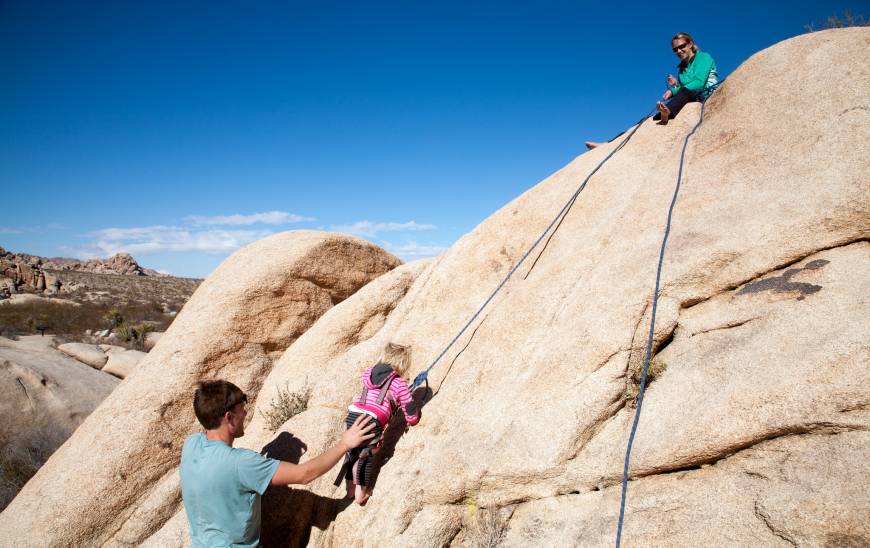 Marshall Burke and his wife rocking climbing with their two-year-old daughter at Joshua Tree. Credit: Marshall Burke
Marshall Burke and his wife rocking climbing with their two-year-old daughter at Joshua Tree. Credit: Marshall Burke
Burke says the time he spends in the mountains and deserts are not just for his own mental well being and happiness. “It’s a constant reminder about the things I work on and what’s at stake,” he said.
He acknowledged that many of the predictions from climate change impact studies are frightening and depressing, but he thinks there is a silver lining that often gets overlooked. "We live in a unique moment in history when we have a wealth of tools and data that can help us understand how human societies and the environment are coupled," Burke said.
"We are learning about ourselves and we can shape our trajectories in ways that we wouldn't have been able to if we didn't have this information. To me, that's very hopeful."
Ker Than is associate director of communications for the School of Earth, Energy & Environmental Sciences.


